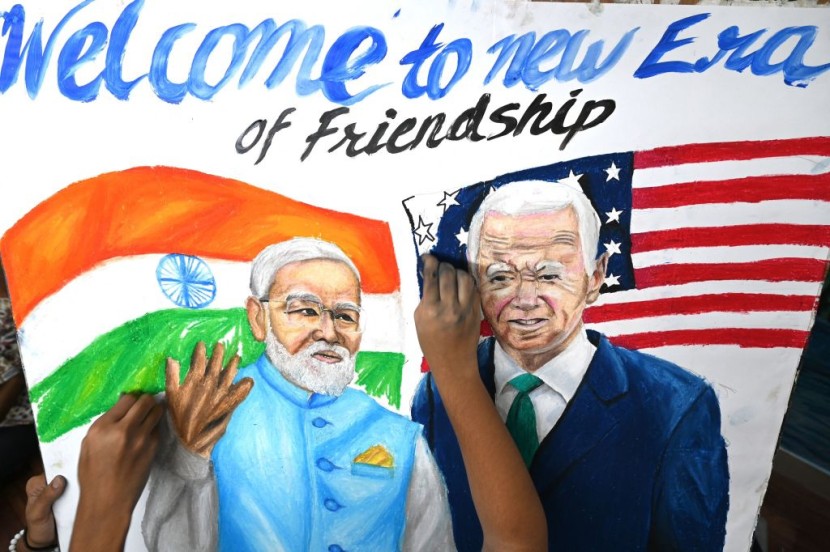
The White House announced Thursday evening that reporters traveling with President Joe Biden to India for this week's G20 summit will not be able to pose questions to Biden and Indian Prime Minister Narendra Modi when the two leaders meet in New Delhi, despite the administration's repeated requests for greater press access.
This is different from a typical bilateral visit to India, with meetings in the prime minister's office and a full schedule, national security adviser Jake Sullivan said on Thursday.
Press Access Restrictions During Biden-Modi Meeting at G20 Summit in India
The host of the G20 is hosting a significant number of leaders in his home, and he has established the protocols he established.
In a follow-up exchange, Sullivan told reporters, "Of course," the administration pressed for a pool spray of the meeting, as is customary when Biden hosts foreign dignitaries at the White House, joking, "We spend our lives asking for pool sprays and other things" for reporters.
Since assuming power, Modi has rarely taken queries, drawing international criticism from press freedom groups critical of the Indian prime minister's crackdown on independent reporting.
After lengthy and delicate negotiations, Modi consented to participate in a news conference at the White House during a state visit in June. Indian officials initially balked at the White House's insistence at conducting one, two US officials familiar told CNN at the time.
The administration has been eager to emphasize the president's willingness to criticize Modi on press freedom and humanitarian issues while in power. Per Republic World, six Democratic lawmakers boycotted Modi's address to Congress during his June visit, with Reps. Rashida Tlaib, Ilhan Omar, and Alexandria Ocasio-Cortez cite India's treatment of its Muslim minorities.
Biden welcomed the Indian prime minister to the White House with a formal state dinner - only the third of his administration - for the controversial Indian leader, citing a shared commitment to democracy between the two nations.
On Thursday, White House press secretary Karine Jean-Pierre told reporters that the administration was "doing our darndest, doing our best" to guarantee media access to the president during his summit trip to India.
Numerous officials, including Sullivan, the White House communications director Ben LaBolt, the deputy national security adviser Jon Finer, and the deputy assistant to the president and coordinator for the Indo-Pacific Kurt Campbell, reportedly contacted their Indian counterparts to argue for greater press access during the visit, but to no avail.
Instead of addressing reporters after the summit's conclusion in New Delhi, President Biden will conduct a news conference in Vietnam, where it will be "easier" for the president to take questions from reporters, according to the White House.
Sullivan stated that, aside from Biden's meeting with Modi, it is unlikely that there will be many formal engagements with foreign leaders during the G20 summit. The restricted press access during the impending G20 summit has raised transparency and accountability concerns, as per Daily Mail.
While the White House has assured the public that efforts have been made to increase media access, it appears that the Indian government's protocols for the summit have taken precedence, preventing reporters from questioning the leaders.
This situation is particularly noteworthy given the ongoing scrutiny of press freedom issues in India under Prime Minister Modi's leadership. Critics argue that an assault on independent reporting has stifled the country's press freedom, making it all the more critical for the international media to have access to leaders and decision-makers during significant events such as the G20 summit.
During Modi's state visit to the United States in June, when President Biden criticized his Indian counterpart on these issues, the Biden administration's commitment to addressing press freedom and humanitarian concerns in India was highlighted. However, the restricted access granted to reporters during the G20 summit may cast doubt on such diplomatic efforts' efficacy in promoting press freedom in India.
The decision to conduct a news conference in Vietnam as opposed to India has also sparked discussions about the logistical difficulties and ramifications of such a move. While the White House argues that it would be "easier" to conduct the conference in Vietnam, some may view this decision as a missed opportunity to address crucial issues concerning India's press freedom and human rights situation on Indian soil.
Eyes on Biden-Modi Interactions and Implications for US-India Relations
As the G20 summit unfolds, observers will intently monitor President Biden and Prime Minister Modi's interactions and statements.
Formal bilateral meetings may be limited, but informal discussions and interactions on the sidelines of the summit could shed light on the state of US-India relations and the extent to which press freedom and other human rights issues are being addressed at the highest levels of government.
The limited press access during the G20 summit between President Biden and Prime Minister Modi has raised concerns about transparency and accountability, particularly concerning press freedom issues in India. The decision to conduct a news conference in Vietnam instead of India has sparked discussions regarding this move's logistical and diplomatic implications.
As the summit progresses, the international community will closely observe how these issues are addressed and whether significant progress can be made in advancing press freedom and human rights.








